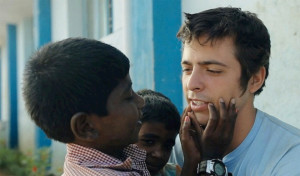
By: Katie Auwaerter | The Duquesne Duke
The seventh annual Human Rights Film Festival at Duquesne University will begin this Thursday, Jan. 23 at 7:00 p.m. in College Hall 105.
This year’s film series is themed “Conflict and Community.” The theme was chosen because “the only way to tackle the conflicts in our world is by acting in unison as a community—as a community of nations, a community of citizens, or a community of students who volunteer for a local cause that’s dear to their hearts,” as stated by the 2014 Duquesne University Human Rights Film Series Committee in an email to The Duke.
The committee is comprised of four professors from the Modern Languages and Literatures departments, specifically Edith Krause, Karl Skutski, Mark Frisch and Mary Ann Hess.
Each film will be paired with a speaker, whose message will align with the theme of the movie that will be shown that week.
The film series will kick off with speaker Sara Noel from Amizade Global Service Learning and the documentary Blood Brother, which follows the story of native Pittsburger Rocky Braat. After traveling through India and meeting a group of HIV positive children in an orphanage, Braat decided to leave his somewhat normal American life to live with these children.
The film Tough Guise 2 will be shown on Jan. 29, along with speaker Dr. Thomas F. Matta, author of Voices of Men: The Shaping of Masculinities in Three Subcultural Contexts.
The documentary is an update to Tough Guise, where anti-sexist male activist Jackson Katz blames the issue of male violence on the outdated concepts of masculinity. Looking at different forms of violence, “the film provides a stunning look at the violent, sexist and homophobic messages boys and young men routinely receive from virtually every corner of culture, from television, movies, video games, and advertising to pornography, the sports culture, and US political culture,” according to the synopsis for the Media Education Foundation.
On Feb. 6, the film Seeds of Death will look at Genetically Modified Organisms, or GMOs, and through speaker Sara Heald, Director of GMO Free Pittsburgh. The documentary explores the propaganda of genetic engineering corporations such as DuPont and Monsanto, as well as the dirty underbelly of industrial agriculture. In a statement on his PowerFoods website, producer Gary Null believes viewers will walk away from Seeds of Death with an unmistakable idea in mind.
“The film’s message is clear: the future of food security that relies upon GMOs will devastate the planet and create catastrophic health and food crises to the world population.”
The issue of the world’s water supply will be the topic of Feb. 10. The film Last Call at the Oasis, funded by the same company that financed An Inconvenient Truth, will alert viewers about why they should be concerned about the current system for obtaining clean water.
The discussion of the world’s water supply will continue with two speakers: Dr. Stan Kabala, associate director of the Center for Environmental Research and Education at Duquesne and Matt Burnett, a junior supply chain management major and founder of Pure Thirst, an organization working to bring clean water to the people of Honduras.
The film for Feb. 19 will be Bully, which follows the stories of five teens and how bullying has influenced their lives. The documentary highlights not only teachers and administration, but also parents and students battling an issue that defies class, race and gender lines.
The Bully Project, which is the social action campaign inspired by the movie, describes the film as “beautifully cinematic, character-driven documentary. At its heart are those with huge stakes in this issue whose stories each represent a different facet of America’s bullying crisis.”
To finish the film series on Feb. 24 will be the showing of Girl Rising, along with speaker Dr. Waganesh Zeleki, assistant professor in the Department of Counseling, Psychology and Special Education at Duquesne.
Girl Rising shows the importance of giving females the opportunity for education by following the stories of nine females across the world. The stories are written by renowned writers and voiced by celebrities such as Alicia Keys, Selena Gomez, and Anne Hathaway. While the stories differ, the message, as stated on the Girls Rising website, is the same: “Educate Girls and you will Change the World.”
The committee believes the films motivate students to take action, making the world a better place to live.
“In the past, we have students who have been so inspired by a certain film, that they decided, on their own, to do some fund-raising to bring the wife of a Sudanese refugee to Pittsburgh. There are well over 50 on-campus organizations that students can get involved in today to help make a difference in our world,” the commitee said

